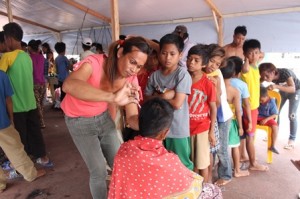The Department of Social Welfare and Development, in partnership with Technical Skills and Development Authority (TESDA), recently launched a skills training program at the JFE Sports Complex. A skills livelihood tent was established inside the complex which also serves as a productivity center for the evacuees.
DSWD Assistant Secretary Camilo Gudmalin said that the training aims to develop and enhance the skills of some of the evacuees particularly on bead-crafts making, hair cutting, and reflexology/massage.
He stressed the need to engage the evacuees in productive activities which form part of the recovery and rehabilitation phase. “These activities can help them regain normalcy in their lives,” Asec. Gudmalin added.
As agreed by both agencies, training for each module lasts for five days. Trainees are given TESDA training certificate once they completed the training program.
Judith Gonzales, TESDA trainor for bead-craft said that there were 20 individuals who registered for the training on bead-craft. Materials such as beads and nylon strings were provided to the trainees for their initial products, like key chains and wallets. She added that training on bead-craft has no age requirement as the skill can be learned even by a 10-year old kid.
DSWD committed to purchase the products made by the trainees at the end of the five(5)-day training.

Mr. Winfred Turco, another TESDA trainor, said that there were about 20 males who registered for the basic massage and reflexology training.
Mr. Turco said that having skill in reflexology could come in handy especially in instances where there are no available medicines. Reflexology is considered an alternative medicine involving the physical act of applying pressure to certain points of the body.
Free haircut for evacuees and cash-for-work for hair cutters and barbers.
To provide some income to the trained hair cutters and barbers, the DSWD gave them P200 a day for every 17 hair cut completed under the supervision of the TESDA personnel. This is part of the cash-for-work project implemented in the evacuation center.
Sajid Ulama of TESDA said they have trained a total of 45 evacuees on hair cutting. As of October 4, a total of 3,930 individuals have availed of the free hair cut services of the trained hair cutters and barbers.
Alrash-di Radjuli of Kasanyangan, one of the trained hair cutter said that he is happy to be of service to his fellow-evacuees. “Kahit sa konting paraan makakatulong ako sa kapwa ko gamit ang konti kong kaalaman sa paggupit. Ok lang sana kahit walang bayad kasi may training certificate naman kami pero nagpapasalamat ako dahil meron din akong matatanggap na konting pera. (Even in a small way, I could be of service to my fellow evacuees through my little knowledge in hair cutting. But I am even more thankful that aside from the training opportunity and the TESDA certificate, I will be receiving a little amount out of this work).”
Angel disclosed that prior to the conflict, he earned a living providing home service hairdressing, getting a daily income of P300-P500.
Dona, also an evacuee from Rio Hondo, shared that he works at a local salon located in the down town area. But with the conflict, work was temporarily suspended.
“Buti na lang merong Cash-for-work dito, kahit papano kikita ako ng kaunti para sa pamilya ko at nakatulong pa ako sa kapwa ko dito sa evacuation center,” (It is good that they implemented the Cash-for–Work program as I get to earn a small amount for my family and also help my fellow evacuees),” Dona shared.
Asec. Gudmalin said that the free haircut service also hopes to provide a new look for student-evacuees as they prepare for school. He added that the children’s new look symbolizes a new beginning, and provides a perspective of normalcy to the children. ###


